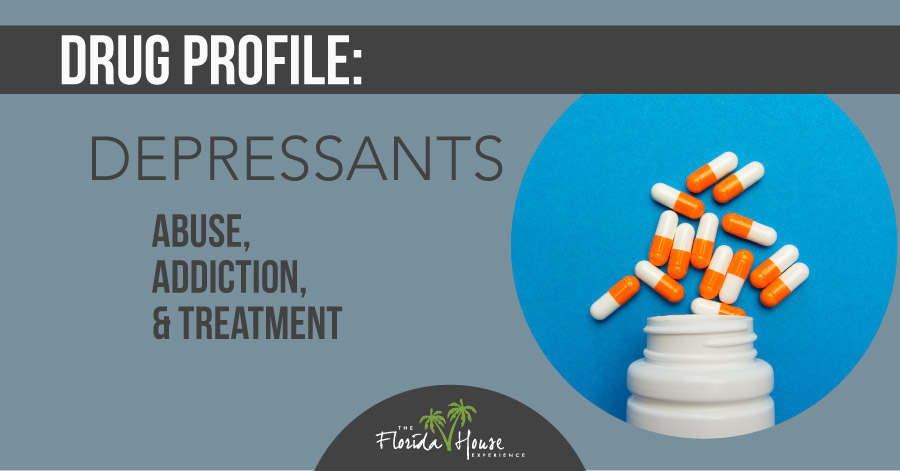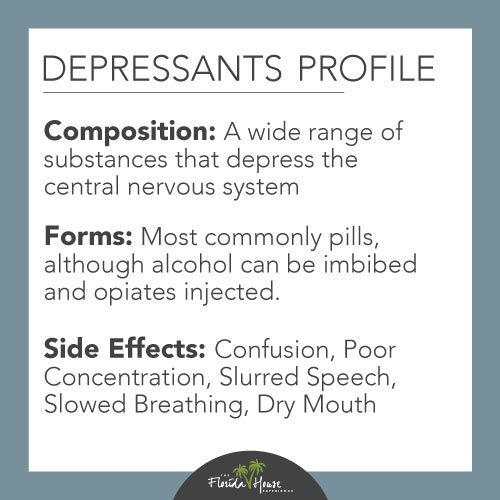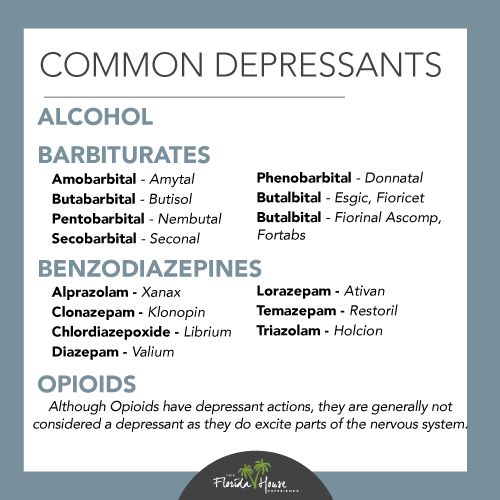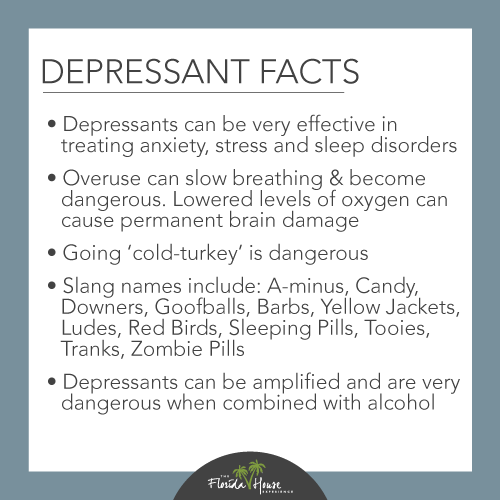
Depressants, also called central nervous system depressants, are a type of prescription medication used for treating anxiety, acute stress reactions, or panic disorders. They work to slow down the brain’s activity and include sedatives, hypnotics and tranquilizers. Here’s a closer look at what depressants are and how they work.
Depressants have long been a drug of choice for celebrities. Judy Garland, the 1950s film star, used barbiturates to unwind after work and died of an overdose in 1969. Elvis also famously used these drugs. More recently, Heath Ledger used these drugs as a way to control anxiety and stress. He, too, died as a result.
Sedatives like these are used by 500,000 people or more in the United States, according to a report from the Substance Abuse and Mental Health Services Administration. Understanding their impact is critical to learning about your own addiction.
Identifying Depressants: What Is a Depressant?
 The term depressants or CNS depressants represents a large number of drugs, most of which are prescription medications. Here’s a closer look at some of the commonly used types.
The term depressants or CNS depressants represents a large number of drugs, most of which are prescription medications. Here’s a closer look at some of the commonly used types.
Barbiturates, which were commonly used in the mid-1900s, include drugs such as Pentothal, butalbital and Nembutal. These are highly addictive but also create tolerances quickly, requiring the individual to use more to get the same high. A newer classification is benzodiazepines, which includes Valium, Restoril, Ativan and Xanax, as well as Lunesta, Sonata and Ambien.
Numerous nicknames and slang terms are used to describe these medications, such as blue bullets, pink ladies and rainbows. You may hear about combinations such as double trouble, downers, busters and lay back. Barbs, quads and phenos are a few additional nicknames.
Because there are so many specific drug types that fall under the category of depressants, you will find they vary significantly. Nearly all are available in pill form, though some are available as liquids or capsules. They can be sold in ground-up formulas as well.
What Do Depressants Do?
Depressants work to increase the activity of gamma-aminobutyric acid (GABA) in the brain, which works to slow activity and communication in the central nervous system. Depressants create a calming effect, helping a person who suffers from anxiety or stress to relax. They also often cause the user to become tired, uncoordinated and unable to focus.
Common side effects of depressants include:
- Confusion
- Poor concentration
- Slurred speech
- Slowed breathing
- Low blood pressure
- Dry mouth
- Dizziness and lightheadedness
The effects of depressants are short-lived, lasting for only a few hours. Over time, the amount used must be increased to create the same level of high.
Why Are Depressants Used?
Depressants offer benefits to some people. Used in a controlled environment and for a limited amount of time, they can reduce anxiety, depression, stress and symptoms of sleep disorders. They can also help with handling acute stress reactions and panic.
Addiction and Depressants

While sudden overdose is a real risk, the long-term impact of using depressants is also worrisome. Addiction and substance use disorder can develop in those who have used even small amounts of depressants over time. The development of a tolerance to the drug is a key concern. Most doctors will prescribe one form of a depressant for a short period of time and then switch to another to minimize this risk.
Depressant Withdrawal Symptoms
Those using depressants illicitly can feel significant withdrawal symptoms if they suddenly stop using them. Those symptoms may include:
- Extreme agitation
- Anxiety
- Seizures
- Insomnia
- Overactive reflexes
- Hallucinations
- Increased heart rate and blood pressure
- Sweating
- Severe cravings
- Sudden cardiac death
Signs of Short-Term Abuse with Depressants
Immediately after beginning to abuse depressants, you may notice signs such as:
- Sleepiness
- Lack of self-control
- Slurred speech
- Blurry vision
- Confusion
- Memory loss
- Impaired judgment
- Poor mental function
This results from the brain’s slowed function. When a person who has just started using drugs stops, they may experience milder withdrawal symptoms.
Signs of Long-Term Abuse with Depressants
Over time, tolerance develops. However, even those with a prescription can develop an addiction to depressants. Long-term signs of abuse include:
- Insomnia
- Other sleep problems
- Impaired sexual function
- Depression or other mental health disorders
- Breathing difficulties
- Convulsions
Those who use depressants over a long period typically are on the lookout for new drugs when the older varieties stop working as well. In some cases, they may try to mix alcohol — another depressant — with medications, which can be lethal.
Is Alcohol a Depressant?
Alcohol is a type of depressant. Most often, people drink alcohol to loosen up and relax. In this way, it works as a stimulant. However, consuming too much alcohol in a single sitting results in a depressant-like response.
How to Get Treatment for Depressant Addiction

Detox
Detoxing from the drug in a medically controlled climate is essential. This ensures a doctor can monitor your health or that of your loved one over the detox period. Detoxing may require the use of other substances to help reduce the risk of heart-related or brain-related complications such as sudden cardiac arrest, seizures and lack of breathing.
Inpatient Care
Inpatient care tends to be beneficial to those who use depressants. During this process, counselors and doctors work together to help build the addiction mindset. It is common for counselors to use cognitive behavioral therapy to accomplish these goals.
In some cases, mental health disorders such as anxiety, depression and self-harm are evident. The proper treatment location is needed to focus on providing care across the board here, for both the medical and the mental health needs of the patient.
Outpatient Care
After spending several weeks to months in inpatient care, many people are able to move to outpatient care. Outpatient care may be suitable to those with a mild or short-term addiction as well. Treatment is generally in both group and individual sessions. Working on cognitive behavior therapy, counseling and coping skills are a focus.
FHE Health Offers Treatment for Depressant Addiction
For men and women using depressants for any reason, it is critical to seek out substance use disorder care from a trusted and experienced location. Don’t try to stop on your own. Instead, work with a fully skilled location for all medical and mental health needs. At FHE Health, we provide a safe place for detoxing and both short-term and long-term care. Contact us to learn more about our services.






